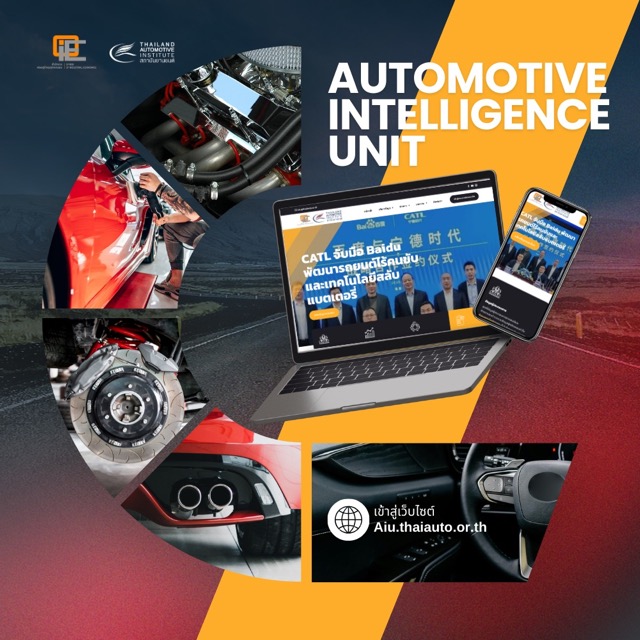- Silver
- สมาชิกระดับ Silver
- ฟรี
- สามารถเข้าถึงข้อมูลข่าวสารขั้นพื้นฐานได้
- ข้อมูลผู้ประกอบการต่างประเทศ
- ข้อมูลสถิติในประเทศและต่างประเทศ
- มาตรการทางการค้าระหว่างประเทศ
- กฎ ระเบียบ นโยบายในประเทศ
- เทคโนโลยี และงานวิจัย
- สมัครสมาชิก
ค้นหาข้อมูล
ความเคลื่อนไหวในอุตสาหกรรม
งานมอเตอร์โชว์ 2019 ที่กำลังจัดขึ้นอยู่ตอนนี้ ที่เมืองทองธานีและกำลังจะสิ้นสุดลงในวันที่ 7 เมษายนนี้ ต้องบอกเลยว่ามีเรื่องราวชวนให้ติดตามมากมาย ยิ่งปีนี้ค่ายกรังด์ปรีซ์จัดใหญ่เพราะครบรอบปีที่ 40 ใครที่ยังลังเลหรือกำลังจดๆจ้องๆ ไม่อยากให้พลาดด้วยประการทั้งปวง โดยเฉพาะนิทรรศการที่ทางผู้จัดงานเตรียมพื้นที่ พาย้อนรำลึกไปยังอดีตเพื่อสัมผัสกับบรรยากาศบอกเล่าความเป็นมาและการเติบโตของงานมอเตอร์โชว์ตั้งแต่ครั้งแรกที่สวนลุมพินี เมื่อปี 2522 มาจนถึงปัจจุบัน มาจนถึงปัจจุบัน ซึ่งได้เห็นพัฒนาการของงานที่ยิ่งใหญ่ ถือว่าเป็น 40 ปีที่ช่วยผลักดันให้อุตสาหกรรมรถยนต์บ้านเราขยายตัวขึ้นอย่างรวดเร็ว สามารถทำยอดขายต่อปีมากกว่า 1 ล้านคัน ถึงบรรทัดนี้ ต้องขอตีมือดังๆให้ ดร.ปราจิน เอี่ยมสำเนา หัวเรือใหญ่ของค่ายกรังปรีช์ อีกเรื่องที่หลายคนชื่นชอบ คือรางวัลรถยอดเยี่ยมแห่งปี ซึ่งเขาเฟ้นทั้งซื่อมวลชน ผู้เชี่ยวชาญด้านรถยนต์อาจารย์คณะวิศวกรรมศาสตร์จุฬาฯ ฯลฯ มาเป็นกรรมการตัดสิน รางวัลดังกล่าวนับว่าเป็น “ไกด์” ให้ลูกค้าเลือกซื้อรถได้ตรงตามโจทย์ที่ตัวเองต้องการ ปีนี้ยังมีเพิ่มเติมรางวัล “ประธานบริษัทที่สมาร์ทที่สุดแห่งปี ซึ่ง คุณโทชิอากิ มาเอคาวะ กรรมการผู้จัดการ บริษัท ตรีเพชรอีซูซุเซลล์ จำกัด ได้รับมอบรางวัลพิเศษ The Smartest CEO of The Year
ที่มา : หนังสือพิมพ์ ประชาชาติธุรกิจ ฉบับวันที่ 1 เมษายน 2562
- รายละเอียด
- หมวด: ความเคลื่อนไหวในอุตสาหกรรม
- อ่าน: 1569 ครั้ง
ที่มา : หนังสือพิมพ์ ข่าวสด ฉบับวันที่ 28 มีนาคม 2562
- รายละเอียด
- หมวด: ความเคลื่อนไหวในอุตสาหกรรม
- อ่าน: 1568 ครั้ง
บริษัท โตโยต้า มอเตอร์ ประเทศไทย จำกัด เปิดตัว เลกซัส UX ยนตรกรรมหรู คอมแพกต์ ครอสโอเวอร์ รุ่นใหม่ล่าสุด มาพร้อมกับเทคโนโลยีมากมาย เครื่องยนต์ระบบไฮบริด 2.0 ลิตร โครงสร้างตัวถังแบบใหม่ GA-C ( Global Architecture – Compact Platform ) พร้อมด้วยการเชื่อมต่อตัวถังด้วยระบบเลเซอร์ เอกสิทธิ์เฉพาะของเลกซัส และการใช้อะลูมิเนียมเข้ามาเป็ฯองค์ประกอบของตัวรถ ส่งผลให้ได้ตัวถังที่มีน้ำหนักเบาและแข็งแกร่ง มีจุดศูนย์ถ่วงต่ำ ระบบไฮบริดเจเนอร์เรชั่นที่ 4 รุ่นล่าสุด ติดตั้งเทคโนโลยีความปลอดภัย เลกซัส เซฟตี้ ซิสเต็ม พลัส (Lexus Safety System Plus) เจเนอเรชั่นที่ 2 พร้อมระบบป้องกัน มาพร้อมกับรุ่นเอฟ สปอร์ต (F SPORT) ได้รับการถ่ายทอดดีเอ็นเอจากรถสปอตซุปเปอร์คาร์อย่าง เลกซัส แอลเอฟเอ (Lexus LFA) ชุดแต่งรอบคันและเบาะนั่งดีไซน์เฉพาะของเอฟ สปอร์ต ให้ความรู้สึกโอบกระชับ เพิ่มความเร้าใจจากเสียงเครื่องยนต์ในการขับขี่ด้วยระบบ แอ๊กทีฟ ซาวด์ คอนโทรล (Active Sound Control) และระบบกันสะเทือนแบบแปรผัน อแดพทีฟ แวเรียเบิล ซัสเพนชั่น (Adaptive Variable Suspension) ช่วยดูดซับแรงของโช๊คอัพที่ล้อทั้ง 4 ให้ตอบสนองต่อการควบคุมของผู้ขับขี่และสภาพพื้นผิวถนนได้อย่างเหมาะสม
ที่มา : หนังสือพิมพ์ มติชน ฉบับวันที่ 27 มีนาคม 2562
- รายละเอียด
- หมวด: ความเคลื่อนไหวในอุตสาหกรรม
- อ่าน: 1616 ครั้ง
นางอรมน ทรัพย์ทวีธรรม อธิบดีกรมเจรจาการค้าระหว่างประเทศ เปิดเผยว่า ได้เตรียมความพร้อมกรณีที่สหรัฐจะมีการเรียกเก็บภาษีสินค้ายานยนต์เพิ่มขึ้นในอัตรา 25% หลังจากที่กระทรวงพาณิชย์สหรัฐได้ส่งรายงานความมั่นคงแห่งชาติ มาตรา 232 ถึงนายโดนัลด์ ทรัมป์ ประธานาธิบดีสหรัฐให้พิจารณาตัดสินแล้ว โดยขั้นตอนจากนี้ต้องรอประธานาธิบดีสหรัฐตัดสินใจภายใน 90 วันว่าจะดำเนินการตามคำแนะนำรายงายงานฉบับนี้หรือไม่ คาดว่าจะทราบผลภายในเดือน พ.ค.นี้
อย่างไรก็ตาม หากสหรัฐมีการเรียกเก็บภาษีสินค้ายานยนต์และชิ้นส่วนตามมาตรา 232 จริง แนวทางที่จะแก้ไขปัญหาเพื่อลดผลกระทบของผู้ประกอบการไทย จะยึดแนวทางเดียวกับสินค้าเหล็กและอะลูมิเนียมที่สหรัฐเคยเรียกเก็บภายใต้มาตรา 232 เมื่อต้นปี 61 ที่ผ่านมา โดยไทยจะขอยกเว้นการเรียกภาษีสินค้าทั้งประเทศ โดยจะต้องชี้แจงถึงสาเหตุที่สหรัฐยังคงจำเป็นต้องนำเข้ายานยนต์และชิ้นส่วนจากไทยอยู่ เช่น อุตสาหกรรมภายในสหรัฐไม่มีการผลิต หรือสินค้าที่นำเข้าจากไทยไม่ส่งผลกระทบต่อความมั่นคงภายในสหรัฐ รวมทั้งจะขอยกเว้นภาษีเป็นรายบริษัท ที่จะต้องประสานกับผู้นำเข้าสหรัฐในการขอยกเว้น
ที่มา : หนังสือพิมพ์ เดลินิวส์ ฉบับวันที่ 26 มีนาคม 2562
- รายละเอียด
- หมวด: ความเคลื่อนไหวในอุตสาหกรรม
- อ่าน: 1541 ครั้ง
ภาครัฐของหลายประเทศกำลังพยายามหาทางนำผู้ประกอบการเข้าสู่ตลาดแอฟริกา โดยมีแม่เหล็กดึงดูดสำคัญจากความอุดมสมบูรณ์ของทรัพยากรธรรมชาติ โดยเฉพาะแร่ธาตุซึ่งมีอยู่หลายชนิดและมีมูลค่าทางเศรษฐกิจเพิ่มขึ้นมากในปัจจุบัน อาทิ สาธารณรัฐประชาธิปไตยคองโก เป็นแหล่งผลิตแร่โคบอลต์ ซึ่งเป็นส่วนประกอบสำคัญของแบตเตอรี่ ที่ใหญ่ที่สุดในโลก แม้อุตสาหกรรมรถยนต์ในทวีปแอฟริกายังมีขนาดเล็กด้วยกำลังการผลิตเพียงปีละ 1 ล้านคัน แต่ทวีปแอฟริกาเป็นที่ตั้งฐานการผลิตของค่ายรถยนต์กว่า 10 ค่าย จากทั้งยุโรป ญี่ปุ่น และสหรัฐ โดยประเทศในทวีปแอฟริกาที่ค่ายรถยนต์เข้าไปลงทุนมากที่สุด คือ แอฟริกาใต้ ตามมาด้วยโมร็อกโก โดยในช่วงระหว่างปี 2556-2560 ปริมาณการผลิตรถยนต์ในทวีปแอฟริกา ขยายตัวเฉลี่ยถึง 10% ต่อปี ผู้ประกอบการของไทยที่สนใจส่งออกชิ้นส่วนรถยนต์ควรหาทางเร่งทำตลาดแอฟริกาในช่วงที่อุตสาหกรรมกำลังเติบโตอย่างรวดเร็ว และเป็นทางเลือกที่น่าสนใจในระยะยาว เพราะนอกจากทวีปแอฟริกาจะมีแรงงานจำนวนมาก คาดาจะมีจำนวนแซงหน้าจีนและอินเดียในอีก 15 ปีข้างหน้าแล้ว ประเทศต่างๆ ในทวีปแอฟริกายังให้ความสำคัญกับการขจัดอุปสรรคทางการค้าและการลงทุนระหว่างกัน เพื่อเพิ่มปริมาณการค้าภายในกลุ่ม ซึ่งปัจจุบันอยู่ในระดับต่ำที่สุดในโลกเพียง 18% เมื่อเทียบกับยุโรปที่สูงถึง 70% และเอเชียที่ราว 45%
ที่มา : หนังสือพิมพ์ โพสต์ทูเดย์ ฉบับวันที่ 25มีนาคม 2562
- รายละเอียด
- หมวด: ความเคลื่อนไหวในอุตสาหกรรม
- อ่าน: 1962 ครั้ง
ที่มา : หนังสือพิมพ์ ประชาชาติธุรกิจ ฉบับวันที่ 25 มีนาคม 2562
- รายละเอียด
- หมวด: ความเคลื่อนไหวในอุตสาหกรรม
- อ่าน: 1640 ครั้ง
- รายละเอียด
- หมวด: ความเคลื่อนไหวในอุตสาหกรรม
- อ่าน: 3659 ครั้ง
ค่ายรถเปิดตัวอีวี
- รายละเอียด
- หมวด: ความเคลื่อนไหวในอุตสาหกรรม
- อ่าน: 3996 ครั้ง


